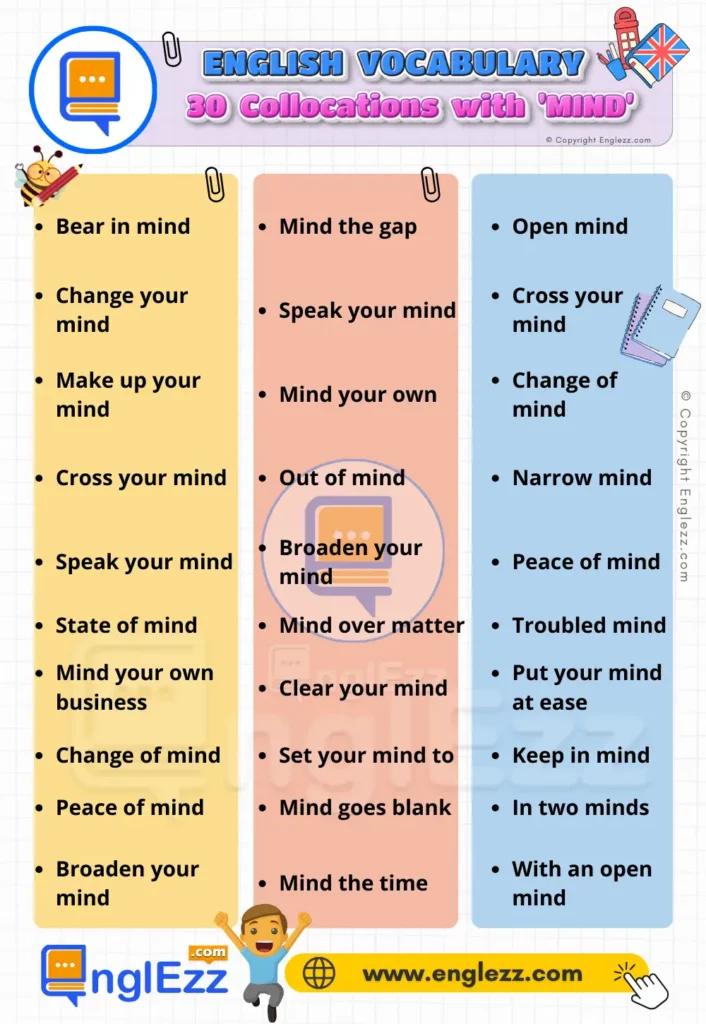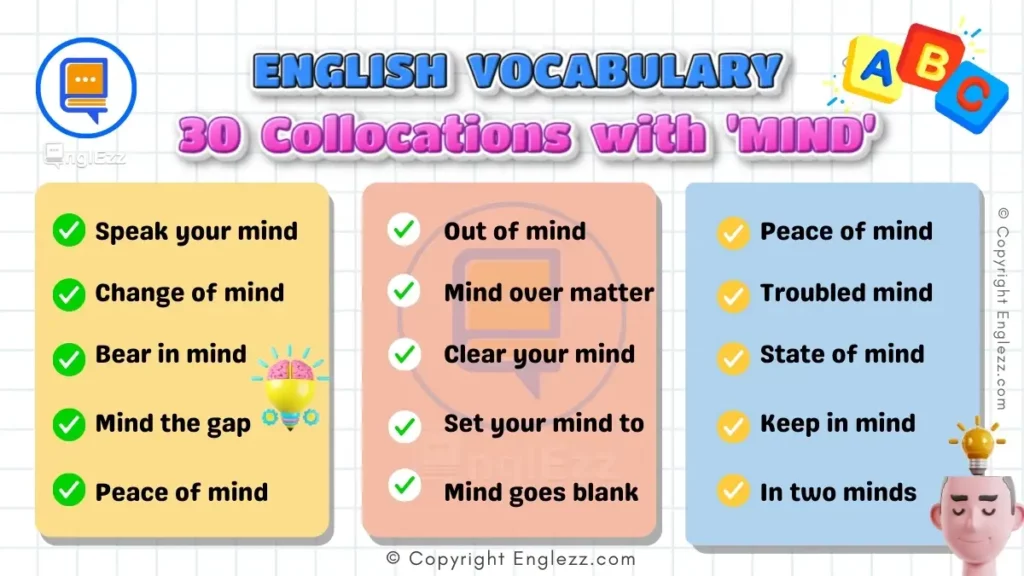Mastering English collocations is essential for anyone aiming to sound more natural and fluent in the language. Collocations are pairs or groups of words that are commonly used together, and knowing them can significantly boost your comprehension and communication skills. In this post, we’ll explore 30 essential collocations with mind, providing you with the definition, phonetic transcription, and two practical examples for each.
Table of Contents
- 30 Essential Collocations with Mind 🧠 Boost Your English Skills
- #1. 🧠 “Change your mind”
- #2. 🧠 “Bear in mind”
- #3. 🧠 “Make up your mind”
- #4. 🧠 “Mind your own business”
- #5. 🧠 “Have something in mind”
- #6. 🧠 “Speak your mind”
- #7. 🧠 “Cross your mind”
- #8. 🧠 “Mind the gap”
- #9. 🧠 “Put your mind to something”
- #10. 🧠 “Mind over matter”
- #11. 🧠 “Out of sight, out of mind”
- #12. 🧠 “Mind your manners”
- #13. 🧠 “Mind your step”
- #14. 🧠 “Give someone a piece of your mind”
- #15. 🧠 “Mind your language”
- #16. 🧠 “Out of your mind”
- #17. 🧠 “Peace of mind”
- #18. 🧠 “Keep an open mind”
- #19. 🧠 “Mind your P’s and Q’s”
- #20. 🧠 “Set your mind at ease”
- #21. 🧠 “Mind the store”
- #22. 🧠 “Mind your head”
- #23. 🧠 “Frame of mind”
- #24. 🧠 “To my mind”
- #25. 🧠 “Weigh on your mind”
- #26. 🧠 “Mind your back”
- #27. 🧠 “Be in two minds”
- #28. 🧠 “Be of one mind”
- #29. 🧠 “Open-minded”
- #30. 🧠 “Out of your mind with worry”
- Collocations With Mind Table
- Most Common Collocations With Mind Worksheet
- Wrapping Up
30 Essential Collocations with Mind 🧠 Boost Your English Skills
One of the most versatile words in English is “mind,” which pairs with a variety of verbs, adjectives, and nouns to create phrases that carry specific meanings. Understanding and using these collocations correctly can make your speech and writing more impactful and polished.
Whether you’re preparing for an exam, writing an essay, or simply trying to improve your English, these collocations will give you the tools you need to express yourself clearly and effectively. Plus, we’ll sprinkle in some useful resources and links, like our English courses and English exercises online, to help you continue your learning journey.
Let’s dive into the fascinating world of collocations with “mind” and enhance your English fluency together!
#1. 🧠 “Change your mind”
Definition: To change a decision or opinion.
Phonetic Transcription: /ʧeɪndʒ jɔːr maɪnd/
Examples:
- She was going to cancel the trip, but she changed her mind.
- After hearing the news, he changed his mind about the project.
#2. 🧠 “Bear in mind”
Definition: To remember or consider something.
Phonetic Transcription: /bɛər ɪn maɪnd/
Examples:
- Bear in mind that this offer is only valid for a limited time.
- When planning your trip, bear in mind the weather conditions.
#3. 🧠 “Make up your mind”
Definition: To decide on something.
Phonetic Transcription: /meɪk ʌp jɔːr maɪnd/
Examples:
- It’s time to make up your mind about the job offer.
- He couldn’t make up his mind about which car to buy.
#4. 🧠 “Mind your own business”
Definition: To refrain from interfering in others’ affairs.
Phonetic Transcription: /maɪnd jɔːr oʊn ˈbɪznɪs/
Examples:
- She told him to mind his own business when he asked about her plans.
- I wish people would mind their own business instead of gossiping.
#5. 🧠 “Have something in mind”
Definition: To be thinking about something specific.
Phonetic Transcription: /hæv ˈsʌmθɪŋ ɪn maɪnd/
Examples:
- Do you have a specific restaurant in mind for dinner?
- I have something in mind for the presentation next week.
#6. 🧠 “Speak your mind”
Definition: To express your opinions openly.
Phonetic Transcription: /spiːk jɔːr maɪnd/
Examples:
- She always speaks her mind, even if it’s controversial.
- If you don’t agree, feel free to speak your mind.

#7. 🧠 “Cross your mind”
Definition: To briefly think about something.
Phonetic Transcription: /krɔs jɔːr maɪnd/
Examples:
- The idea of quitting never crossed her mind.
- It crossed my mind to call her, but I was too busy.
#8. 🧠 “Mind the gap”
Definition: A phrase used to warn passengers to be careful when stepping between the train and the platform.
Phonetic Transcription: /maɪnd ðə gæp/
Examples:
- Mind the gap when boarding the train.
- The announcement repeatedly said, “Mind the gap.”
#9. 🧠 “Put your mind to something”
Definition: To focus on achieving something.
Phonetic Transcription: /pʊt jɔːr maɪnd tə ˈsʌmθɪŋ/
Examples:
- You can do it if you really put your mind to it.
- She put her mind to studying and passed the exam.
#10. 🧠 “Mind over matter”
Definition: The use of willpower to overcome physical problems.
Phonetic Transcription: /maɪnd ˈoʊvər ˈmætər/
Examples:
- Completing the marathon was a case of mind over matter.
- With determination, it’s all about mind over matter.
#11. 🧠 “Out of sight, out of mind”
Definition: When something is not visible, it is easily forgotten.
Phonetic Transcription: /aʊt əv saɪt aʊt əv maɪnd/
Examples:
- Once they moved away, they were out of sight, out of mind.
- I put the cookies in the cupboard—out of sight, out of mind.
#12. 🧠 “Mind your manners”
Definition: To behave politely.
Phonetic Transcription: /maɪnd jɔːr ˈmænərz/
Examples:
- Remember to mind your manners at the dinner party.
- Children should be taught to mind their manners.
#13. 🧠 “Mind your step”
Definition: Be careful of where you are walking.
Phonetic Transcription: /maɪnd jɔːr stɛp/
Examples:
- Mind your step on the icy path.
- The sign read, “Mind your step” as you entered.
#14. 🧠 “Give someone a piece of your mind”
Definition: To express your anger to someone.
Phonetic Transcription: /ɡɪv ˈsʌmˌwʌn ə piːs əv jɔːr maɪnd/
Examples:
- She gave him a piece of her mind after he broke the vase.
- He was ready to give his boss a piece of his mind.
#15. 🧠 “Mind your language”
Definition: Be careful with the words you use.
Phonetic Transcription: /maɪnd jɔːr ˈlæŋɡwɪdʒ/
Examples:
- The teacher warned the students to mind their language.
- Mind your language when talking to elders.
#16. 🧠 “Out of your mind”
Definition: To be crazy or irrational.
Phonetic Transcription: /aʊt əv jɔːr maɪnd/
Examples:
- Are you out of your mind? That’s a dangerous idea!
- She must be out of her mind to think that’s possible.
#17. 🧠 “Peace of mind”
Definition: A state of mental calmness and tranquility.
Phonetic Transcription: /piːs əv maɪnd/
Examples:
- Knowing your family is safe gives you peace of mind.
- They offer insurance for your peace of mind.
#18. 🧠 “Keep an open mind”
Definition: To be willing to consider new ideas.
Phonetic Transcription: /kiːp ən ˈoʊpən maɪnd/
Examples:
- When discussing the proposal, try to keep an open mind.
- She kept an open mind during the debate.
#19. 🧠 “Mind your P’s and Q’s”
Definition: To be on your best behavior and act politely.
Phonetic Transcription: /maɪnd jɔːr piːz ənd kjuːz/
**Examples:
- Make sure you mind your P’s and Q’s at the formal dinner.
- She reminded her son to mind his P’s and Q’s.
#20. 🧠 “Set your mind at ease”
Definition: To reassure or comfort someone.
Phonetic Transcription: /sɛt jɔːr maɪnd ət iz/
Examples:
- The doctor set my mind at ease by explaining the procedure.
- To set your mind at ease, everything is under control.
#21. 🧠 “Mind the store”
Definition: To take care of things while someone else is away.
Phonetic Transcription: /maɪnd ðə stɔr/
**Examples:
- I need you to mind the store while I’m on vacation.
- He was trusted to mind the store during the owner’s absence.
#22. 🧠 “Mind your head”
Definition: Be careful to avoid hitting your head.
Phonetic Transcription: /maɪnd jɔːr hɛd/
Examples:
- The sign read, “Mind your head” as you enter the low doorway.
- He reminded her to mind her head when entering the cave.
#23. 🧠 “Frame of mind”
Definition: A particular mood or attitude.
Phonetic Transcription: /freɪm əv maɪnd/
Examples:
- She was in a good frame of mind before the interview.
- His frame of mind was positive after the meeting.
#24. 🧠 “To my mind”
Definition: In my opinion.
Phonetic Transcription: /tə maɪ maɪnd/
Examples:
- To my mind, this is the best solution.
- The film, to my mind, was rather disappointing.
#25. 🧠 “Weigh on your mind”
Definition: To be a source of worry or concern.
Phonetic Transcription: /weɪ ɑn jɔːr maɪnd/
Examples:
- The decision weighed on her mind all week.
- His financial troubles weighed on his mind.
#26. 🧠 “Mind your back”
Definition: Be careful of people or things behind you.
Phonetic Transcription: /maɪnd jɔːr bæk/
Examples:
- The busy kitchen worker shouted, “Mind your back!”
- Mind your back when carrying those heavy boxes.
#27. 🧠 “Be in two minds”
Definition: To be undecided.
Phonetic Transcription: /bi ɪn tuː maɪndz/
Examples:
- I’m in two minds about whether to accept the offer.
- He was in two minds about going on vacation.
#28. 🧠 “Be of one mind”
Definition: To agree or share the same opinion.
Phonetic Transcription: /bi ʌv wʌn maɪnd/
Examples:
- They were of one mind about the need for reform.
- The team was of one mind on the project’s direction.
#29. 🧠 “Open-minded”
Definition: Willing to consider different ideas or opinions.
Phonetic Transcription: /ˈoʊpən ˈmaɪndɪd/
Examples:
- She’s very open-minded and always listens to new ideas.
- Being open-minded is essential in a diverse workplace.
#30. 🧠 “Out of your mind with worry”
Definition: Extremely anxious or worried.
Phonetic Transcription: /aʊt əv jɔːr maɪnd wɪð ˈwʌri/
Examples:
- She was out of her mind with worry when her child was late.
- He was out of his mind with worry during the storm.
Collocations With Mind Table
| Bear in mind | Mind the gap | Change of mind |
| Change your mind | Speak your mind | Cross your mind |
| Make up your mind | Mind your own | Open mind |
| Cross your mind | Out of mind | Narrow mind |
| Speak your mind | Broaden your mind | Peace of mind |
| Put your mind at ease | Mind over matter | Troubled mind |
| Mind your own business | Clear your mind | State of mind |
| Change of mind | Set your mind to | Keep in mind |
| Peace of mind | Mind goes blank | In two minds |
| Broaden your mind | Mind the time | With an open mind |
Most Common Collocations With Mind Worksheet

Wrapping Up
Understanding and effectively using collocations with “mind” is a valuable skill that can significantly enhance your English proficiency. These common phrases will not only make your speech and writing sound more natural but also help you convey your thoughts more clearly. By incorporating these collocations into your everyday language, you’ll find it easier to express complex ideas and emotions with precision.
Don’t stop here! Continue to expand your vocabulary by exploring more English courses, practicing with English exercises online, and even shopping for resources that can aid your learning on platforms like Vieauty and My Petist. Remember, language learning is a continuous journey, and with each new collocation you master, you’re one step closer to fluency. Keep your mind open, practice regularly, and watch as your English skills flourish!
Happy learning! 😊









📚✨Discover our latest post on essential “mind” collocations at EnglEzz!
🌟 Dive into practical examples and enhance your vocabulary with phrases that will elevate your English skills. Follow and like EnglEzz for more insightful content!
.
https://www.englezz.com/30-essential-collocations-with-mind/
#englezz #EnglishVocabulary #LanguageLearning #FluentEnglish #Collocations #WordPower #LearnEnglish